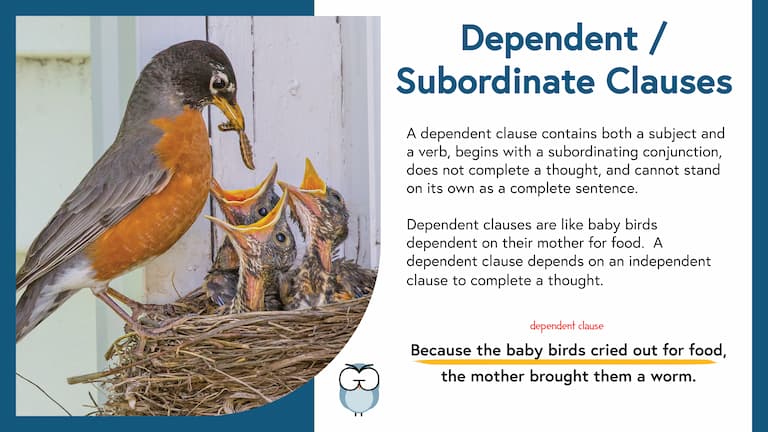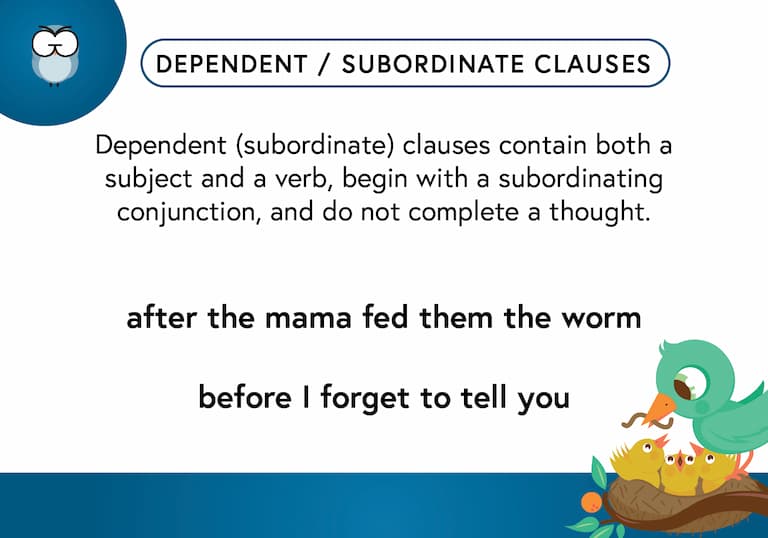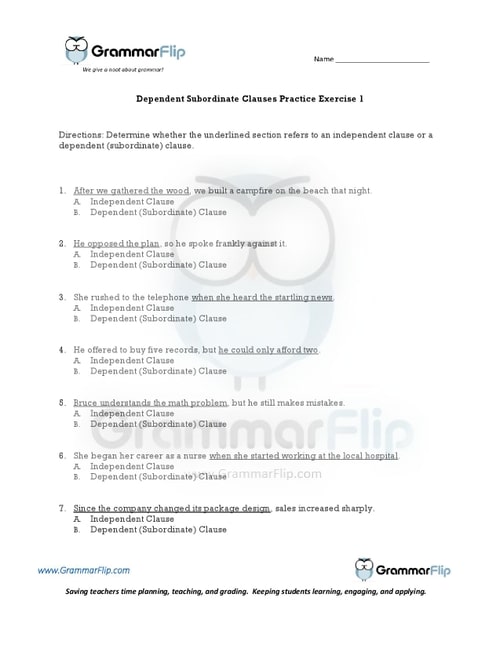What is a Dependent or Subordinate Clause?
A dependent or subordinate clause contains both a subject and a verb, begins with a subordinating conjunction, does not complete a thought, and cannot stand on its own as a complete sentence.
Some dependent/subordinate clause examples would be the following:
after we finished the puzzle
although Kayla had already seen the movie
before I forget to tell you
unless she finishes her homework early
whenever Greg goes to the beach
Notice how each dependent clause above begins with a subordinating conjunction. This subordinating conjunction is a clue that tells you this could be the beginning of a dependent clause. If a subject and verb come after this subordinating conjunction and it does not complete a thought, then you have a dependent/subordinating clause.
Long-Form Videos: Dependent/Subordinate Clauses
Long-form instructional video lessons allow students to engage with grammar concepts in more depth and detail.
This format provides students with a stronger foundation and a more comprehensive understanding of dependent/subordinate clauses.
Short-Form Videos: Dependent/Subordinate Clauses
Short-form videos are an excellent way to review grammar concepts. Our two-minute instructional videos help students review the concept of dependent/subordinate clauses to further solidify their understanding.
Memorable Images: Dependent/Subordinate Clauses

The use of images to connect visual cues with concepts makes it simpler for students to grasp and remember key ideas. GrammarFlip’s memorable images create visual associations that make dependent clauses more engaging and easier to retain.
Definition Cards: Dependent/Subordinate Clauses
Definition cards reinforce grammar concepts by providing clear and concise explanations that students can easily reference for quick review and better retention. GrammarFlip’s definintion cards help students review the concept of dependent clauses to further solidify their understanding.

Why You Should Use Dependent/Subordinate Clauses in Your Writing
Using dependent clauses in your writing can help you demonstrate cause and effect as well as provide more detail and context in your writing.
Cause and Effect: Dependent clauses can demonstrate how two things are related in your writing, particularly in a situation where cause and effect play a part.
Sasha gets up early every morning because she has swim practice at 6:00am.
Detail and Context: Dependent clauses can provide additional context as well as add detail to your writing.
After Jacobi scored the winning goal, he ran the length of the field in triumph.
Once you have a solid understanding of dependent clauses (as well as independent clauses), be sure to explore noun clauses, adjective clauses, adverb clauses, and elliptical clauses!
Download a Free Worksheet on Dependent/Subordinate Clauses!
Click the image below to download your free worksheet on dependent/subordinate clauses!

How well do your students understand dependent and subordinate clauses?
Explore More GrammarFlip Lessons!
Parts of Speech lessons provide the building blocks of grammar. GrammarFlip covers these topics in detail to ensure a solid foundation is built. First time learners and students seeking to review the parts of speech can both benefit from the instructional videos and slide show reviews.
Parts of the Sentence lessons are critical for understanding how the parts of speech function in language construction. From the basic to the advanced, these lessons will cover a wide range of grammar topics that can be used in any grade level or classroom.
Mechanics and Usage lessons equip students with the necessary skills to communicate clearly to all audiences. With a focus on the application of these concepts in student writing, these lessons tie together both simple constructions of grammar as well as the more complex such that any age or skill level of student will benefit.


